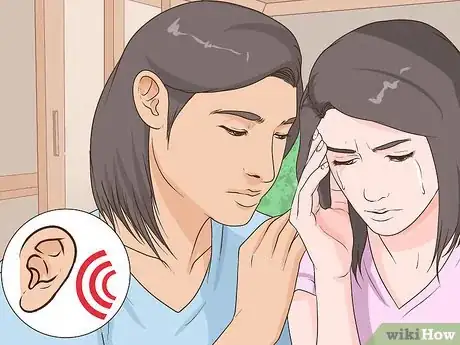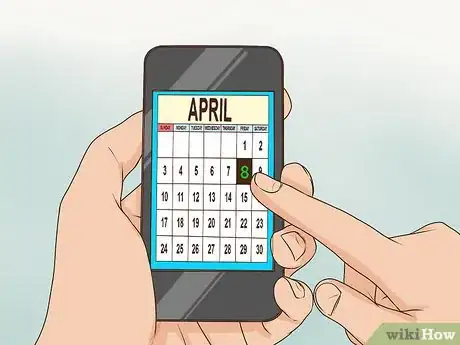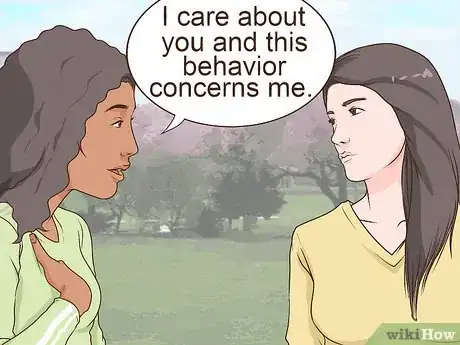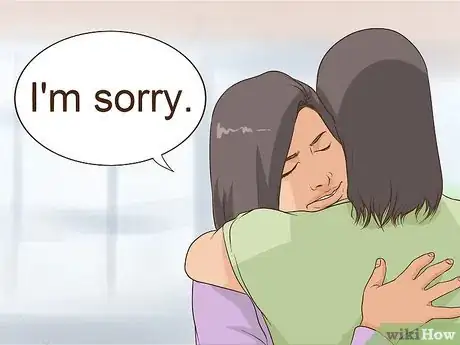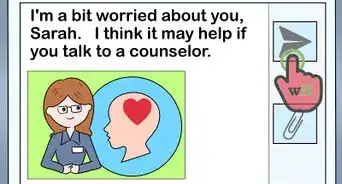This article was co-authored by Lena Dicken, Psy.D. Dr. Lena Dicken is a Clinical Psychologist based in Santa Monica, California. With over eight years of experience, Dr. Dicken specializes in therapy for anxiety, depression, life transitions, and relationship difficulties. She utilizes an integrative approach combining Psychodynamic, Cognitive Behavioral, and Mindfulness-based therapies. Dr. Dicken holds a BS in Integrative Medicine from the University of Hawaii at Manoa, an MA in Counseling Psychology from Argosy University Los Angeles, and a Doctor of Psychology (Psy.D) in Clinical Psychology from the Chicago School of Professional Psychology at Westwood. Dr. Dicken’s work has been featured in GOOP, The Chalkboard Magazine, and in numerous other articles and podcasts. She is a licensed psychologist with the state of California.
wikiHow marks an article as reader-approved once it receives enough positive feedback. In this case, several readers have written to tell us that this article was helpful to them, earning it our reader-approved status.
This article has been viewed 107,433 times.
Everyone enjoys having friends. If you have a good friend in your life, you probably want to maintain a solid relationship with that person. You may be wondering what you need to do to be a nice friend. In order to be a high quality companion, support your friend in good and bad times. Spend time with your friend regularly, and keep up contact even at a distance. Lastly, work on good communication skills to avoid fights and misunderstandings.
Steps
Supporting Your Friend
-
1Be happy for your friend's accomplishments. If you want to be a supportive friend, one of the most important things you can do is to be happy for your friend's accomplishments. Work on being your friend's biggest fan. Applaud his or her achievements and try not to feel jealous.[1]
- Jealousy can often make it difficult to celebrate another person's success, even someone you consider a friend. However, it's very important that you are able to cheer you friend on. People want to be around positive people who make them feel good about themselves. Even if you're feeling a twang of envy, try to push past that feeling and offer a sincere, "Congratulations." You'll feel better if you do. You'll find it's much less exhausting to be happy for another person than harboring jealousy.
- Do not just congratulate your friend on big achievements or milestones. You should also compliment your friend on small things he or she does that you appreciate. Remind your friend of his or her good qualities. For example, say something like, "I love how you're always smiling" or "I appreciate how you always remember everyone's birthday."
-
2Listen when your friend's in need. Listening is the foundation of a quality friendship. If you know your friend is having a bad day, offer to let your friend vent to you. You do not have to offer solutions or even advice. Simply allow your friend to express his or her feelings without judgment.[2]
- If you're unsure what to say when listening, try active listening. This will allow your friend to feel more open expressing his or herself to you. You can reiterate what your friend says after he or she finishes talking, encouraging your friend to elaborate if necessary. For example, say something like, "You feel really stressed about the way your brother behaved when he came to visit?"
- Keep in mind that, while listening is important, you do not want to end up in a one-sided friendship. If you feel like your friend is always asking you to listen, but is never there for you in return, you may want to reevaluate the friendship. Being a nice friend is important, but you do not want to end up in a situation where someone is taking advantage of your good nature. If you listen to your friend, expect him or her to listen to you when you're in need.
Advertisement -
3Remember important events. The little things help build the foundation of a strong friendship. Make the effort to remember the important events in your friend's life, like birthdays, anniversaries, and more.[3]
- Always remember your friend's birthday. It can help to write a reminder in your smart phone. You don't necessarily have to go overboard with a big present each year. However, your friend may appreciate a nice phone call or card.
- Does your friend have any other big life events that are important? Even sad events are worth of remembrance. For example, if your friend has lost a loved one, the death anniversary can be difficult. Try to keep this in mind, and shoot your friend a text letting him or her know you're there if he or she needs to talk.
-
4Have loyalty. Loyalty is a very important aspect of a strong friendship. Jealousy, envy, bitterness, and distrust are all negative emotions than can affect your ability to be loyal. Try to rise beyond these sentiments and strive for basic loyalty.[4]
- Avoid talking about your friend behind his or her back. Even if you're angry or upset about something your friend did, avoid venting your frustrations to others. Instead, try writing it out and later, when you're more calm, talking to your friend directly about any problems.
- It can be hard to cope with negative emotions that can adversely affect loyalty. However, try to keep in mind the benefits of working past these emotions. What's more important in the long term? Momentarily satiating feelings of jealousy by trash talking your friend, or building a strong lifelong bond?
- One caveat is that loyalty, like listening, has its limitations. While you should be loyal to your friend and support his or her decisions, you do not have to be blindly loyal to someone who is behaving poorly. If, for example, your friend hurt a mutual friend's feelings, do not immediately jump to your friend's defense. It's important that you tell you friend up front if his or her behavior has crossed a line for you or another person.
-
5Practice the golden rule. The Golden Rule states you should treat others as you wish to be treated. When interacting with your friends, pause and think about your actions. If you feel as if you're not treating your friend well, consider how you would feel if you were being treated in this fashion. If you would not appreciate the kind of treatment you're dishing out, you should cease to treat your friend in that way.[5]
Spending Time with Your Friend
-
1Engage in shared interests. Often, friendships are built around common interests. If there's something that drew you and your friend together to begin with, going back to this shared interest can help strengthen your bond.[6]
- For example, if you and your friend met at a book club, try agreeing to read the same book. You can meet up once a week to discuss the book. Your friend will love having you there to share this experience.
- You can also pursue shared interests further together. For example, if you and your friend met in college in a Spanish class, consider attending a Spanish club together. You can help build on your language skills as a pair.
-
2Make friendship a priority. As time goes by, friendship can sometimes fall to the wayside. School, work, romantic relationships, and other commitments can put a strain on a friendship.[7] However, if you want to be a nice friend, work on prioritizing the friendships in your life.[8]
- Realistically, as life gets busier and busier, you will not be able to see your friends every day or even every week. However, make an effort to get together regularly. It can help to have a regular meet up time. For example, you can agree to have dinner together the first Tuesday of every month.
- One thing to keep in mind is that you should not prioritize someone who does not prioritize you. You do not want to end up in a one-sided friendship. If you are always the one reaching out and making plans with a particular person, you may be better off tapering off contact. You can work on being a good friend to someone who appreciates your presence.
- Even if time is an issue, you can still find ways to reach out. Many people find they can stay in touch via social media when life gets hectic. You can also make a point of calling a friend to chat once in awhile if you're too busy to go out regularly.
-
3Laugh together. People tend to bond when they laugh together. Your friend will enjoy your company more if the two of you are always laughing. Try to make laughter a priority when you hangout.
- Watch funny movies together or go to comedy clubs.
- Make each other laugh. Do not be afraid to be a little silly or ridiculous. A true friend won't judge you for bringing out your immature side.
- While laughter is important, try not to laugh at the expense of others. You do not want to build a friendship on mutual scorn or animosity. A person willing to laugh and judge others with you will probably not be a nice friend to you in return.
-
4Keep in contact long distance. Unfortunately, distance can sometimes keep good friends apart. In this case, you should make an effort to keep up contact. If your friend moves away for school or work, call or Skype regularly. You can make a plan of calling every other Thursday, for example. You can also strive to stay in touch with your friend through various social media outlets, like Facebook and Twitter.
Communicating with Your Friend
-
1Avoid giving advice. You may feel that being nice means always telling your friend how to fix his or her problems. However, this can make the friendship feel unbalanced. You're always the one with the answers, while your friend is always the one with the problems. Not only this, when your friend opens up to you, he or she may not always be seeking advice. Sometimes, people just want to vent and do not want guidance.[9]
- Simply let your friend talk. Show you're listening by giving non-verbal cues, like smiling and nodding, to convey you're paying attention. Reiterate what she's saying on occasion to make sure you understood fully.
- You should also help your friend bounce ideas off of you. Ask questions like, "What do you think you're going to do?" or "Do you have any idea how to proceed?"
- In the event you're genuinely worried about a decision your friend is making, it's okay to voice your concern. If your friend is considering doing something dangerous or illegal, for example, it's not a bad idea to express concern.
-
2Do not keep score. A nice friend does not make people feel a debt. You should not hold onto things like who gave the best birthday present or who did the last favor. You should do nice things for your friend because you appreciate this person, not as a way to get favors in return.[10]
- People often create petty barriers to friendship. For example, you may feel like you shouldn't invite your friend out on a Saturday night because you did so last week. In your mind, it's your friend's turn. However, some people just aren't great at making plans and prefer to simply go along with what others are doing. Your friend does not owe you an invitation because you extended one to him or her.
- Try to keep in mind you and your friend have different strengths. You may feel like you're always the one hosting events, for example, but maybe your friend is always the one willing to bring over cookies and help with the clean-up.
-
3Tell your friend when he or she is wrong. Being a good friend means you sometimes have to dish out harsh truths. You're not being nice by allowing a friend to repeat the same mistakes. When you see your friend is in the wrong or about to make a mistake, say so. While you may feel bad about this in the moment, in the long run your friend will appreciate your honesty.[11]
- You do not have to be mean when you're telling your friend he or she is in the wrong. In fact, you should come into the situation from a place of love. Say something like, "I'm worried about the way you talk about other people. I know you're a better person than this, and I wish you would be less negative about those who aren't around."
- Reiterate that you care about a friend after telling that person he or she is in the wrong. Say something like, "I'm only saying something because I care about you and this behavior concerns me."
-
4Deal with conflict in a mature fashion. Conflict is inevitable in a friendship. If the two of you are close, you're going to get on one another's nerves. In the event of conflict, try to work things out maturely.[12]
- If you hurt a friend's feelings, apologize. Even if you did not mean something the way your friend took it, if your friend was genuinely hurt, he or she deserves an "I'm sorry."[13]
- If you're upset by something your friend said, tell him or her directly. Do not talk about your friend behind his or her back. This will not resolve the issue and could create further tension.
References
- ↑ http://psychcentral.com/lib/the-care-and-maintenance-of-friendship/
- ↑ Lena Dicken, Psy.D. Clinical Psychologist. Expert Interview. 15 December 2020.
- ↑ http://psychcentral.com/lib/the-care-and-maintenance-of-friendship/
- ↑ http://www.tipsonlifeandlove.com/self-help/the-7-qualities-of-a-good-friend
- ↑ http://psychcentral.com/lib/the-care-and-maintenance-of-friendship/
- ↑ http://www.tipsonlifeandlove.com/self-help/the-7-qualities-of-a-good-friend
- ↑ Lena Dicken, Psy.D. Clinical Psychologist. Expert Interview. 15 December 2020.
- ↑ http://www.huffingtonpost.com/2014/09/04/qualities-of-real-friends_n_5709821.html
- ↑ http://www.realsimple.com/work-life/life-strategies/inspiration-motivation/be-good-friend/stop-giving-advice
- ↑ http://psychcentral.com/lib/the-care-and-maintenance-of-friendship/
- ↑ http://www.huffingtonpost.com/2014/09/04/qualities-of-real-friends_n_5709821.html
- ↑ http://psychcentral.com/lib/the-care-and-maintenance-of-friendship/
- ↑ Lena Dicken, Psy.D. Clinical Psychologist. Expert Interview. 15 December 2020.

